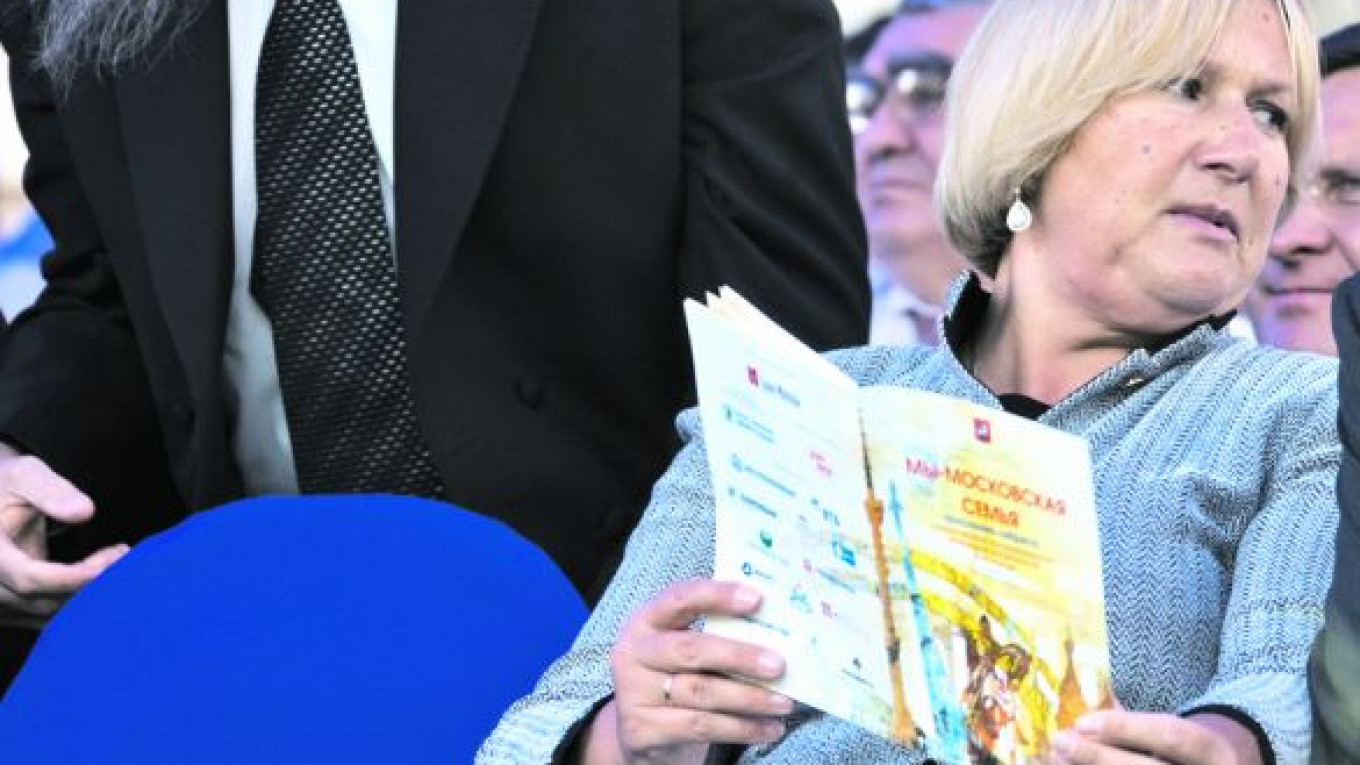Moscow prosecutors are pushing City Hall to cancel an order that allowed Yelena Baturina's Inteko to acquire 55 hectares of land.
Prosecutor General Yury Chaika wrote a letter to President Dmitry Medvedev complaining about the Moscow authorities' inaction on the issue of providing land to diplomatic missions of foreign states.
"In 1993, a presidential order confirmed the list of land plots allotted for 12 foreign representations in Moscow (for China, India, Cuba, Vietnam, Guinea, Afghanistan, Ghana, Nicaragua, Pakistan, Thailand, Mozambique and North Korea) … The government of Moscow and other state agencies, however, did not undertake measures to implement that order," Chaika said in the letter, a copy of which was obtained by Vedomosti.
According to the letter, two plots (16.38 hectares and 38.43 hectares) in western Moscow, which were part of bigger plots formerly owned by Matveyevskoye, were originally allotted for the purpose.
Matveyevskoye's ownership rights on the plots were registered in 2003, but contained violations, the prosecutor's office found. The head of Moscow's Odintsovsky district, Alexander Gladyshev, approved a property rights certificate, but the documents presented to him were not inspected properly, Chaika wrote.
Documents were transferred to the Moscow prosecutor's Investigative Committee to determine whether there would be any criminal proceedings. Prosecutors found signs of criminal offense in the actions of those registering Matveyevskoye's property rights to the disputed plots and in the actions of Gladyshev.
Gladyshev's spokesperson could not comment on the situation, and Matveyevskoye's chief executive Nikolai Kyriny could not be reached.
The plots were later transferred to Territorialnaya Direktsia Setunskaya and Territorialnaya Direktsia Volynskaya, which are both owned by Inteko.
Inteko vice president Oleg Soloshansky told Vedomosti that the company acquired about 150 hectares of land near the Setun River in 2003 from Matveyevskoye. In 2007 and 2008, Mayor Yury Luzhkov, Baturina's husband, signed an order allowing Inteko to build a 727,000-square-meter business center on one of the plots, and a 300,000-square-meter residential complex on the other. The design work is currently being developed for the projects, Inteko's press service said.
On July 7, Moscow prosecutors filed suit in the Tverskoi District Court asking the court to declare Luzhkov's order void because it goes against the requirements of the law on international agreements of the Russian Federation, which gives priority to such agreements in resolving disputes.
An Inteko spokesperson did not know about the lawsuits. On July 26, the court found that the suits were not subject to consideration under civil proceedings, the judge told Vedomosti. It is not known whether that decision was appealed.
In response, Baturina wrote a letter to Medvedev saying the land was acquired in good faith in 2003 and that her rights to the land were "confirmed several times by judicial acts that had acquired legal force long before I obtained rights to this land."
During the seven years of owning the land, no request was made to expropriate the land in order to fulfill international requirements, although there is a legal course for such a procedure, Baturina wrote.
What was happening was "an attempt to justify the inaction of Foreign Ministry officials … who have shifted responsibility onto a business person," Baturina said.
A Foreign Ministry spokesperson declined to comment.
In 2004, the Moscow Arbitration Court considered a suit filed by the Federal Property Management Agency against TS Setunskaya, requesting the court to declare the ownership rights on the 24.4 hectare plot void, Chaika said in his letter. The case was dropped after the agency withdrew the suit.
A spokesperson for the agency could not comment in time for this article.
The statute of limitations for real estate cases is three years, said Vitaly Mozharovsky, a partner at the Goltsblat law firm, but there is still the possibility that the land for diplomatic missions can be expropriated. This falls under international agreements that require Russia to select and supply land to other states.
Landowners must be compensated at market prices for land that has been expropriated, Mozharovsky said. A hectare of land in this area could cost $3 million, said Ilya Terentyev, chief executive of Zemer.
The prosecutor's office filed a report with the Mayor's Office on how to rectify violations concerning international law. Last year, the mayor ordered the city's department of land resources and the city's architecture committee to select land for the diplomatic missions, an official in the Mayor's Office said.
Moscow authorities proposed land in Losiny Ostrov, but that is a national park and thus, federal property, so the Foreign Ministry could not take advantage of the offer, the Foreign Ministry official said.
A request filed by Vedomosti to the prosecutor's office went unanswered.
The fact that no one contested Baturina's rights to the land for many years makes it analogous to the situation with Domodedovo Airport, Mozharovsky said. While it was a provincial airport, no one was interested in it, but as soon as billions of dollars were invested, violations were found in the way that it was privatized.
A Message from The Moscow Times:
Dear readers,
We are facing unprecedented challenges. Russia's Prosecutor General's Office has designated The Moscow Times as an "undesirable" organization, criminalizing our work and putting our staff at risk of prosecution. This follows our earlier unjust labeling as a "foreign agent."
These actions are direct attempts to silence independent journalism in Russia. The authorities claim our work "discredits the decisions of the Russian leadership." We see things differently: we strive to provide accurate, unbiased reporting on Russia.
We, the journalists of The Moscow Times, refuse to be silenced. But to continue our work, we need your help.
Your support, no matter how small, makes a world of difference. If you can, please support us monthly starting from just $2. It's quick to set up, and every contribution makes a significant impact.
By supporting The Moscow Times, you're defending open, independent journalism in the face of repression. Thank you for standing with us.
Remind me later.






